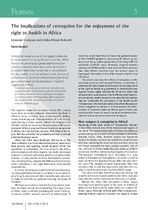| dc.contributor.author | Durojaye, Ebeenzer | |
| dc.date.accessioned | 2019-10-04T11:59:45Z | |
| dc.date.available | 2019-10-04T11:59:45Z | |
| dc.date.issued | 2012 | |
| dc.identifier.citation | Durojaye, E. and Mirugi-Mukundi, G. (2012). 'The implications of corruption for the enjoyment of the right to health in Africa ', ESR Review: 13(3) 3-6 | en_US |
| dc.identifier.uri | http://hdl.handle.net/10566/4876 | |
| dc.description.abstract | Corruption remains one of the biggest obstacles to development in many African countries. While there is no universally agreed definition of corruption, attempts have been made by scholars to explain what may constitute it. According to Bayley (1966), it can be defined as the 'misuse of authority as a result of consideration of personal gain, which need not be monetary'. Friedrich (1990) puts it thus:
'Corruption may also arise where an individual who is granted power by society to perform certain public functions, undertakes, as a result of personal gain or reward, actions that may likely affect negatively the welfare of the society or even injure the public interest' (Fredrich 1990). | en_US |
| dc.language.iso | en | en_US |
| dc.publisher | ESR Review : Economic and Social Rights in South Africa | en_US |
| dc.subject | Corruption | en_US |
| dc.subject | Implications | en_US |
| dc.subject | Enjoyment | en_US |
| dc.subject | Right to health | en_US |
| dc.subject | Africa | en_US |
| dc.title | The implications of corruption for the enjoyment of the right to health in Africa | en_US |
| dc.type | Article | en_US |

